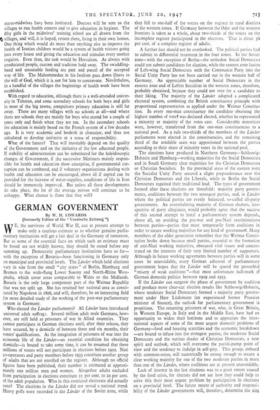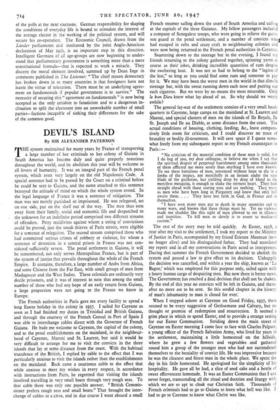GERMAN GOVERNMENT
By W. H. EDWARDS (formerly Editor of the " Vossische Zeitung ")
Who elected the Lander parliaments? All Lander have introduced universal adult suffrage. Several million adult male Germans, how- ever, are still held as prisoners of war in Allied countries. They cannot participate in German elections until, after their release, they have secured, by a domicile of between three and six months, their voters' qualifications. As the integration of prisoners of war into the economic life of the Lander—an essential condition for obtaining domicile—is bound to take some time, it can be assumed that these millions of voters will not participate in elections before 195o. Nazi co-operators and party members before 1933 constitute another group of adults that are not enrolled on the register. Although no official figures have been published, their number is estimated at approxi- mately one million men and women. Altogether adults excluded from participation in elections constitute 15 per cent. to 20 per cent. of the adult population. Who in this restricted electorate did actually vote? The elections in the Lander did not reveat'a national trend. Heavy polls were recorded in the Lander of the Soviet zone, while
they fell to one-half of the voters on the register in rural districts of the western zones. If Germany between the Oder and the western frontiers is taken as a whole, about two-thirds of the voters on the incomplete register participated in the elections. That is about 56 per cent. of a complete register of adults.
A further fact should not be overlooked. The political parties had to submit to differential treatment in the four zones. In the Soviet zone—with the exception of Berlin—the orthodox Social Democrats could not submit candidates for election, while the eastern zone fusion of Left-wing Social Democrats with the Communist Party into the Social Unity Party has not been carried out in the western half of Germany. An appreciable number of Social Democrats in the eastern zone and of Leftist Socialists in the western zones, therefore, probably abstained, because they could not vote for a candidate to their liking. The majority of the Lander adopted a complicated electoral system, combining the British constituency principle with proportional representation as applied under the Weimar Constitu- tion. In every one-man constituency the candidate obtaining the highest number of votes was declared elected, whether he represented a minority or majority of the votes cast. Considerable minorities were, however, transferred from the one-man constituencies to a national pool. As a rule two-thirds of the members of the Lander parliaments were elected in the constituencies, and the remaining third of the available seats was apportioned between the parties according to their share of minority votes in the national pool.
The elections have produced in Northern Germany—Schleswig- Holstein and Hamburg—working majorities for the Social Democrats and in South Germany clear majorities for the Christian Democrats or Christian Socialists. In the provincial areas of the eastern zone the Socialist Unity Party secured a slight preponderance over the Christian Democrats and the Liberals, while in Berlin the Social Democrats regained their traditional lead. The types of government formed after these elections are threefold: majority party govern- ments, coalitions between the two strongest parties, and, in Lander where the political parties are evenly balanced, so-called all-party governments. An overwhelming majority of German electors, irre- spective of party allegiance, would probably agree that the success of this second attempt to instal a parliamentary system depends, above all, on avoiding the pre-war and pre-Nazi recriminations between parties—parties that must temporarily form coalitions in order to secure working majorities for any kind of government. Many members of the older generation remember that the Weimar Consti- tution broke down because small parties, essential to the formation of anti-Nazi working majorities, obscured vital issues and concen- trated on the interests of their very limited number of supporters. Although in future working agreements between parties will in some cases be unavoidable, every German adherent of parliamentary government hopes that the Lander will be spared the proverbial "misery of weak coalitions "—that most unfortunate hall-mark of German domestic politics between 1919 and 1933.
If the Lander can outgrow the phase of government by coalition and produce more clear-cut election results like Schleswig-Holstein, where moderate Social Democrats formed a majority party govern- ment under Herr Liidemann (an experienced former Prussian minister of finance), the outlook for parliamentary government is propitious. The returning prisoners of war, who, in Great Britain, in Western Europe, in Italy and in the Middle East, have had an opportunity to widen their horizons and to appreciate the inter- national aspects of some of the most urgent domestic problems of Germany—food and housing scarcities and the economic breakdown —are bound to infuse into the strongest parties, the moderate Social Democrats and the various shades of Christian Democrats, a new spirit and outlook, which will overcome the parish-pump point of view and the tendency to indulge in self-pity. This group, imbued with common-sense, will numerically be strong enough to secure a clear working majority for one of the two moderate parties in more than one of the Lander, where coalitions are at present unavoidable.
Lack of interest in the last elections was to a great extent caused by the food crisis, for electors did not see how they could help to solve this their most urgent problem by participation in elections on a provincial level. The future extent of authority and responsi-
bility of the Lander governments therefore, determine the size
of the polls at the next electrons. German responsibility for shaping the conditions of everyday life is bound to stimulate the interest of the average elector in the working of the political system, and will secure his co-operation. The Economic Council, drawn from the Lander parliaments and instituted by the joint Anglo-American declaration of May 29th, is an important step in this direction. Intelligent Germans of all age-groups are now beginning to under- stand that parliamentary government is something more than a mere constitutional formula—that is expected to work a miracle. They discern the moral element involved, summed up by Dean Inge in comments published in The Listener: "The chief reason democracy has broken down in so many countries is that foreigners have not learnt the virtue of toleration. There must be an underlying agree- ment on fundamentals if popular government is to survive." The necessity of securing this " agreement on fundamentals " is now being accepted as the only antidote to fanaticism and to a dangerous in- clination to split the electorate into an unworkable number of small parties—factions incapable of sinking their differences for the sake of the common good.



































 Previous page
Previous page